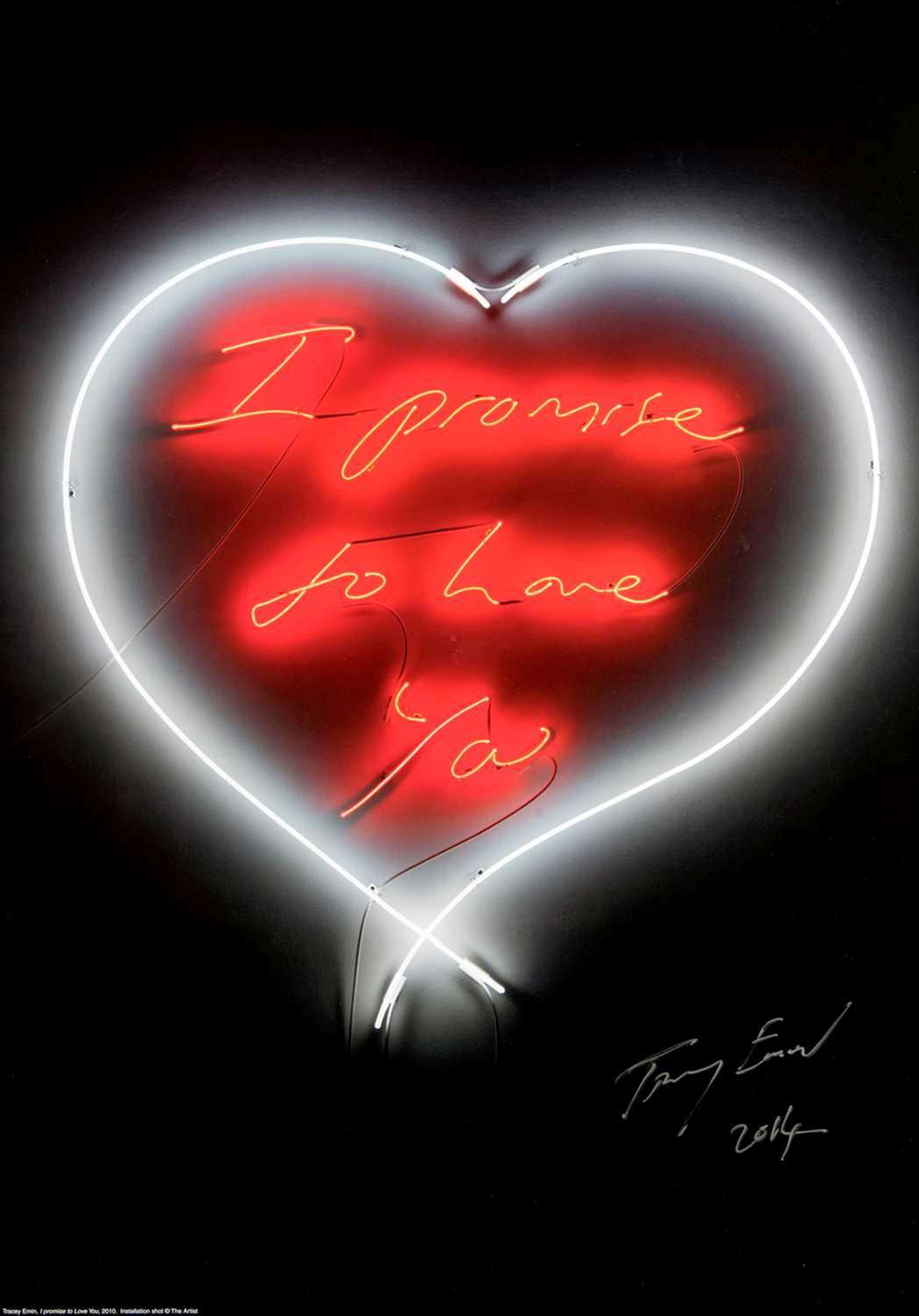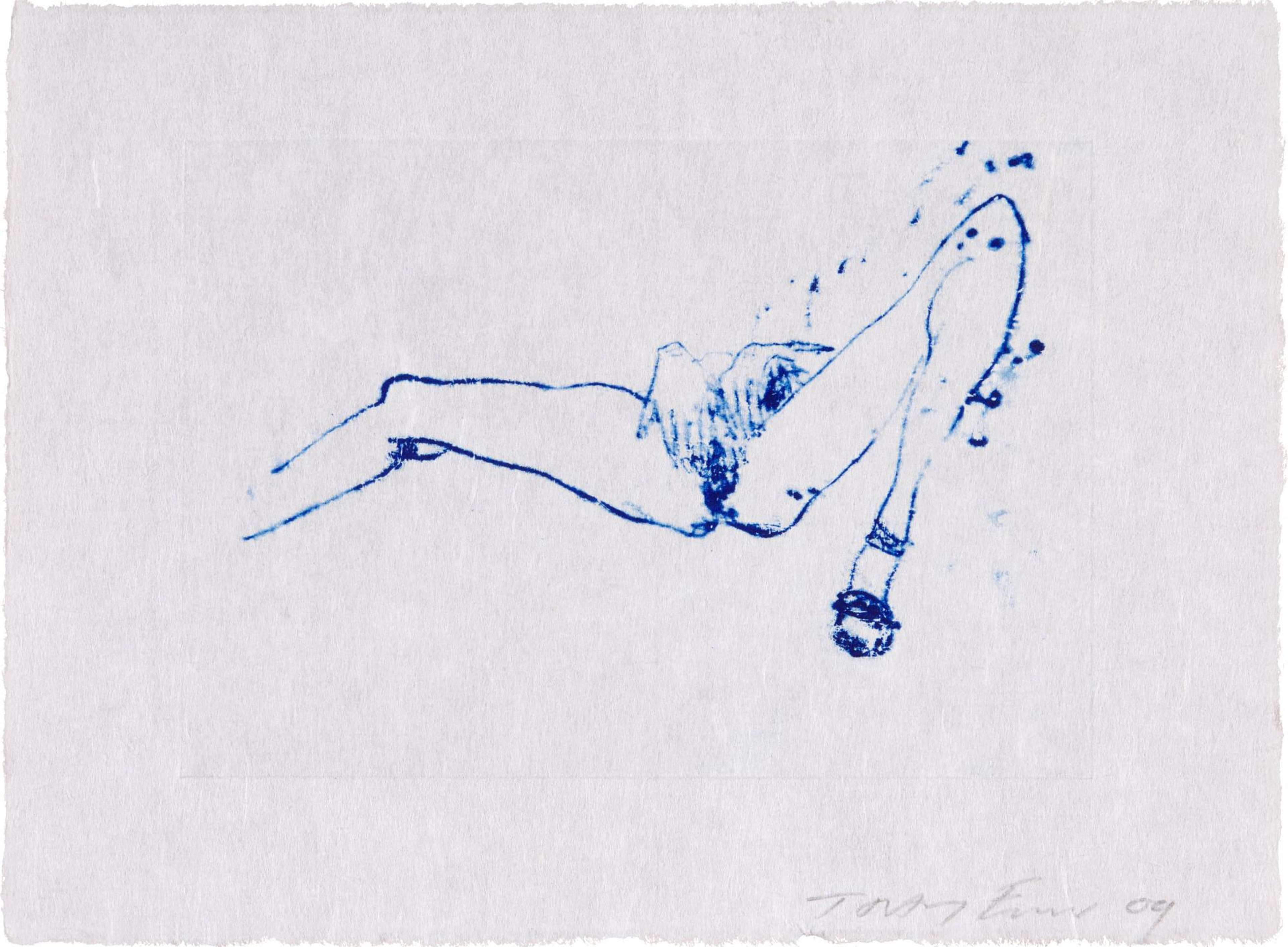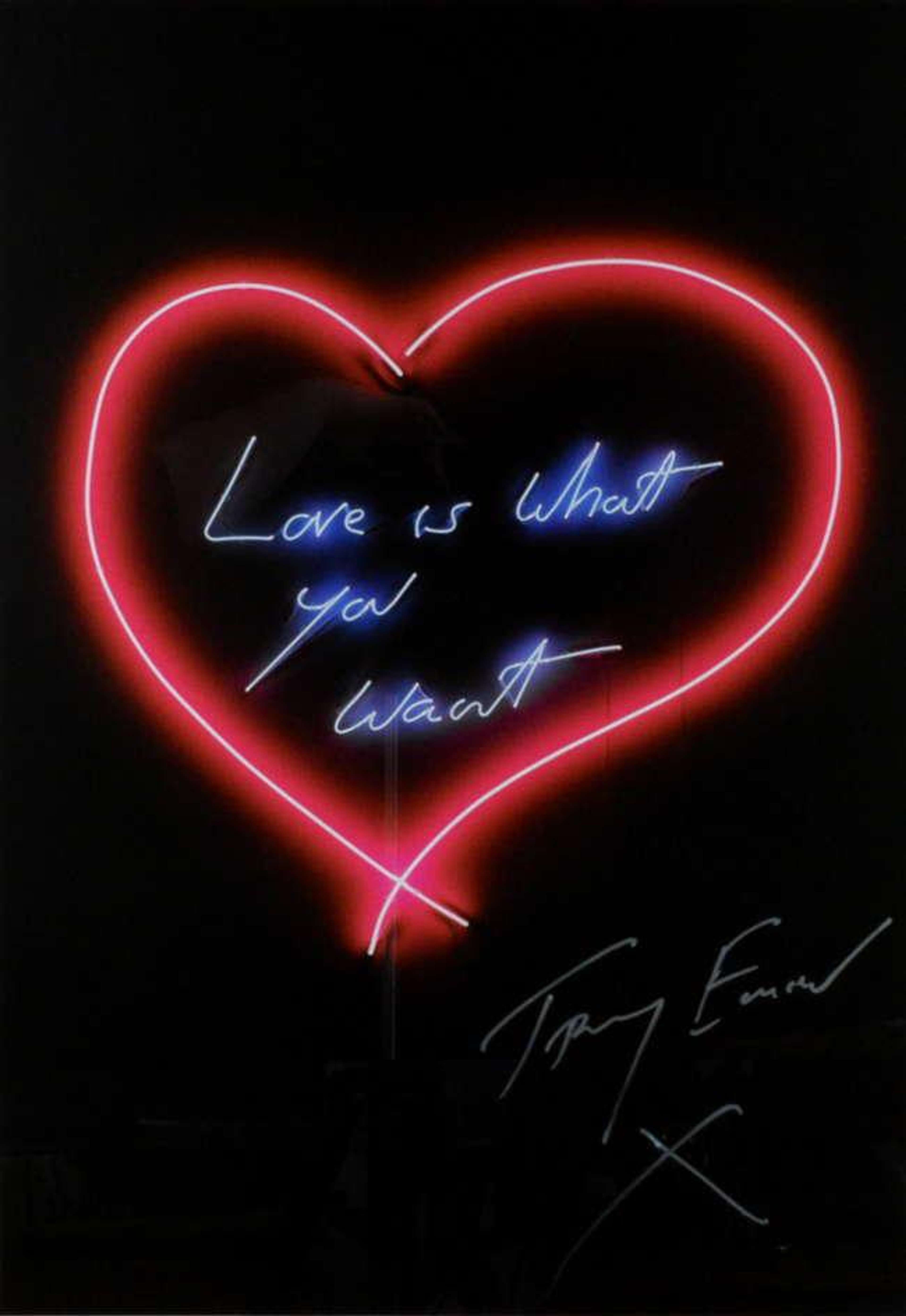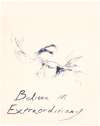The Seller’s Guide To Tracey Emin

 I Promise To Love You © Tracey Emin 2014
I Promise To Love You © Tracey Emin 2014Market Reports
Selling Tracey Emin prints requires a deep understanding of her distinctive artistic voice and evolving market dynamics. As a prominent figure in Contemporary art, Emin’s works - ranging from neon text pieces to intimate monoprints - are increasingly popular among collectors. This guide offers valuable insights into the value, demand, and optimal timing for selling, equipping you with the knowledge needed to maximise returns and navigate the process with confidence and ease.
Emin's passion for printmaking began in 1986 while studying Fine Art and Printmaking at Maidstone Art College, where she produced her first lithograph. This formative experience sparked a lifelong connection to the medium, which she has described as an unpredictable yet deeply rewarding process.
Tracey Emin's diverse printmaking practice spans etchings, screenprints, lithographs, woodcuts, and monoprints, each characterised by raw and emotive aesthetics that reflect her deeply personal artistic voice. Collaborating with renowned studios such as Counter Editions and Paragon Press, she has produced limited-edition works from the early 2000s to the present day. Emin has also ventured into limited-edition photographic prints of her iconic neon artworks, featuring confessional, text-based phrases in her own handwriting. Many of these neon installation prints were published by Emin International, which, though no longer in operation, played a significant role in cementing her legacy in contemporary printmaking.
How much is my Emin print worth?
The value of Emin prints are influenced by various factors, including its subject matter, edition size, provenance, and prevailing market trends. Emin’s works are currently in high demand, with specific themes often commanding premium prices due to their emotional resonance and the powerful feminine narratives they convey. Recent auction results highlight collector preferences and value, showcasing significant interest in a range of her mediums, including neon prints, unique monotypes, nudes, and bird-themed pieces.
Tracey Emin Neon Prints
The Kiss Was Beautiful (2011), a limited-edition neon lithographic print, represents one of Emin's most valuable works in this category, achieving a sale price of £6,400 (including fees) in June 2023. More affordable poster versions, typically priced between £400 and £1,000, offer accessible entry points for collectors. These reinterpretations of Emin's neon LED sculptures are iconic and unmistakably tied to her brand, two key factors that help secure and maintain value for sellers in the market.
Tracey Emin Nudes and Portraits
Emin’s figurative works, especially her nudes and portraits, continue to captivate collectors and attract strong market attention. Spanning from her early 2000s creations to her more recent releases, these pieces demonstrate a consistent rise in appreciation and value. For example, 3.30 AM - Again (2021), a unique lithograph produced with Counter Editions, set a record as Emin’s highest-valued print, selling for £44,100 at Christie’s in October 2023. Complete sets of editioned portraits have also perform exceptionally well; the set These Feelings Were True (2020) holds multiple high-value records, with the top price reaching £47,880 in 2021.
Emin’s early woodcuts and monotypes, such as It Just Happens (2001) and Suffer Love X (2009), are continuing to attract interest and command premium prices due to their status as signed, unique prints. However, Emin has also produced editioned prints of certain monotypes, including various editions of Suffer Love, which are valued slightly lower, from £900 to £1,500 according to MyArtBroker’s Value Indicator.
For sellers, monotypes in Emin’s market will always achieve premium prices due to their uniqueness, but editioned prints of these works offer a more accessible alternative, broadening the buyer base and maintaining strong demand. Understanding these dynamics is key to maximising returns when selling Emin prints.
Birds and Nature Motifs
In the early 2000s, Emin also created a variety of prints featuring delicate portrayals of birds, which are now gaining increasing attention from collectors. This trend was highlighted in October 2024 at Christie’s, where Birds (2012), produced by Counter Editions, achieved a record-breaking sale of £15,120. Similarly, Believe In Extraordinary (2015), another lithograph by Counter Editions, set its own record with a sale of £12,700.
Birds hold a unique place in Emin’s work, offering a somewhat unexpected but fitting addition to her broader themes of freedom, longing, and solitude. Typically released in limited editions ranging from 50 to 300, with some including artist proofs (AP), these works are semi-rare in the market despite the edition size. Their rising popularity in recent years indicates a strong upward trajectory, and with new benchmarks being set, Emin’s bird-themed prints are emerging as compelling prospects to watch closely.
If you’re thinking about selling an Emin print, MyArtBroker's MyPortfolio service offers real-time valuation insights and market data, making it easy to research past auction results and market trends. This tool helps you determine the fair market value (FMV) of your print with confidence.
How do I prove my Emin print is real?
Proving the authenticity of an Emin print requires careful attention to several key details. First, confirm that the edition number on your print matches the official production records. Emin's prints typically include an edition number written in pencil, often in the lower-left corner. If the edition number is missing, unclear, or inconsistent with the print’s production information, this could raise authenticity concerns and impact the selling value.
Tracey Emin's Signature
Always verify the signature. Emin hand-signs all her editions, though the style and placement of her signature can vary depending on the medium. For lithographs and etchings, Emin typically signs in pencil on the bottom-right corner, along with the edition number, while the title is often inscribed on the bottom-left corner. For her digital neon prints, she signs “Tracey Emin X” or “Tracey Emin [year]” in silver ink in the bottom-right corner. However, her photographic editions are not signed.
In her earlier works or unique monotypes, Emin sometimes used alternative materials, such as ink, for signing, depending on the print’s medium and paper type. In rare cases, her signature may be located on the reverse of the print. Understanding these variations and cross-referencing them with verified examples from auction houses or gallery records is crucial for sellers when confirming authenticity.
Tracey Emin Catalogue Raisonné And Provenance
Currently, there is no official catalogue raisonné for Emin’s body of print work that details her editions comprehensively. However, reputable auction houses, galleries, and platforms like MyArtBroker can provide reliable resources to verify edition numbers, signatures, and other essential details to authenticate and value your Emin print accurately.
Establishing provenance is equally important. Collectors should maintain a thorough paper trail, including original invoices, certificates of authenticity, and exhibition records, if available. Emin’s prints often trace back to White Cube Gallery, her primary representation. White Cube has handled the sale of many of her works and provides key documentation in any sale if the print originated from them. While the Tracey Emin Foundation plays a significant role in promoting her artistic legacy, it does not offer authentication services, meaning independent verification is essential.
If you're uncertain about the authenticity of your Emin print, seeking guidance from a trusted expert is highly recommended. MyArtBroker provides free valuations and access to verified specialists through The Directory, a reliable resource for addressing all your print sale needs.
How Do I Know If My Tracey Emin Print Is In Good Condition?
The condition of Emin’s prints and editions is a critical consideration for sellers, as it directly affects their market value. While Emin's works are often created using high-quality materials, even these are not immune to deterioration over time if improperly stored or handled. For prints produced in the early 2000s or earlier, their age should be factored into the condition assessment. Common signs of damage include paper discolouration, buckling, foxing (small brown spots caused by mould or oxidation), or fading from prolonged exposure to light or unsuitable storage conditions.
For instance, Emin’s neon lithographs, often printed on thick, fine-grain paper designed to withstand wear, can still show signs of creasing, edge wear, or other handling-related imperfections if not adequately cared for. Sellers should ensure proper storage and handling practices to maintain the artwork's integrity.
Proper Handling And Restoration for Maximum Value
As a seller, taking proactive steps to preserve the condition of your Emin print. Prints should always be handled with clean hands or art-handling gloves to prevent oils or smudges from affecting the paper. When storing, use acid-free materials and avoid areas with high humidity or fluctuating temperatures, which can cause warping or mould growth. For framed works, opt for UV-protective glass to shield the artwork from sunlight, which can fade colours over time.
If your print shows signs of damage - such as tears, fading, or stains - it may be worth consulting a professional conservator before placing it on the market. For example, digital prints like I've Got It All (2000) may benefit from gentle cleaning or flattening to restore their presentation quality.
For detailed insights on assessing condition and the benefits of restoration, explore our comprehensive restoration guide.
When Is the Best Time To Sell My Tracey Emin Print?
Timing your sale plays a crucial role in maximising the value of Emin prints. Emin's market is often bolstered by her ongoing artistic achievements, record-breaking sales, and high-profile exhibitions, making it essential for sellers to stay informed about key moments in her career.
Tracey Emin Record Auction Sales And Exhibitions
In 2022, Emin's painting Like a Cloud of Blood sold for a record-breaking £2.3 million at auction, landing among her highest valued works, and reflecting a significant surge in her market value. This milestone, coupled with her subsequent exhibitions at White Cube in New York (2023) and London (2024) have showcased works exploring her most popular themes of vulnerability and resilience. Selling during or shortly after such exhibitions can be an opportune time, as heightened visibility often translates to increased demand, which we have seen in Emin's print market.
Tracey Emin Charitable and Philanthropic Contributions
Emin’s philanthropic contributions also play a pivotal role in shaping her market. In 2023, she designed the bronze doors for the newly reopened National Portrait Gallery in London, a project that underscored her cultural significance. Coinciding with this, Emin released a series of limited-edition prints with Counter Editions, further cementing her presence in the art market. These prints not only celebrate her artistic contributions but also attract buyers drawn to the cultural and historical context of the works. Her active involvement in philanthropic and artistic initiatives creates continuous brand awareness, reinforcing her market’s strength.
Emin’s continuous engagement with charitable and artistic endeavors - whether through donating works to major auctions or supporting initiatives like her Margate-based art school - builds her reputation and expands her audience. For sellers, these moments of increased visibility and positive publicity create an ideal backdrop for listing Emin prints, as they can drive up demand and, consequently, the value of her works.
Ways to Sell with MyArtBroker
At MyArtBroker, our specialists provide a free market valuation for your artwork, offering a level of transparency unmatched in today’s market. In addition to our valuations, through our online Trading Floor, you can access real-time insights into works by the artist you’re looking to sell, including pieces that are most in demand, wanted, or currently for sale: allowing sellers to trust the valuation that they are provided.
Additionally, the MyPortfolio collection management service grants you free access to our comprehensive print market database. This resource allows you to review auction histories for the specific work you’re looking to sell, including hammer prices, values paid, and seller returns. In a fluctuating market, this historical data is invaluable - and often comes at a cost elsewhere - offering insights into past and current values to further inform decisions based on market timing and conditions. In addition to our specialists guidance, you have concrete data.
Our approach is tailored to align with the unique attributes of each artwork, and offer optimal results:
How a Private Sale Works
Unlike peer-to-peer platforms, which lack specialised expertise, authenticity guarantees, and legal infrastructure for high-value sales, MyArtBroker operates through private sales ensuring a secure and seamless transaction process. We charge sellers 0% to sell, and take a small commission from our buyers, absorbing essential aspects including insurance, shipping, and marketing - at no extra cost to the seller. There is no magic to it, we’re a lean specialised business with less overheads than traditional models meaning we can do better for our clients.
Our revenue is derived from buyer commissions only, which are individually negotiated upon offer, and we aim to give the client the best return in the market place. By focusing on high-value artworks in excess of £10,000, we provide specialised care and expertise, ensuring each piece receives the attention it deserves, while simultaneously maximising returns with our clients. For works that fall below this threshold speak to the team about a recommendation, we offer market advisory free of charge. Our goal at MyArtBroker is to offer a seamless solution, setting us apart in the art market.
Advisory and Recommendations
In cases for artists and artworks, where our existing network of collectors isn’t the best fit due to value, medium or condition we collaborate with reputable partners to facilitate its sale. Carefully tailoring your artwork to the right party. This tailored approach is especially important as it considers the unique attributes of each artwork, providing sellers with the best possible outcome in today’s shifting art market. You can discuss this approach with us without charge as part of our advisory service.
Such recommendations are on a case-by-case basis, and ensures broader exposure and takes advantage of our knowledge of where a work will do best.


















